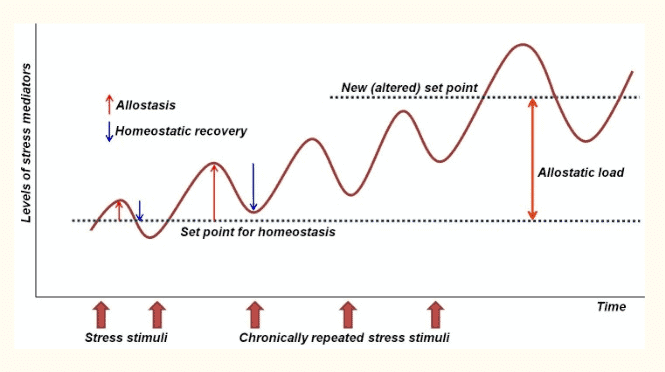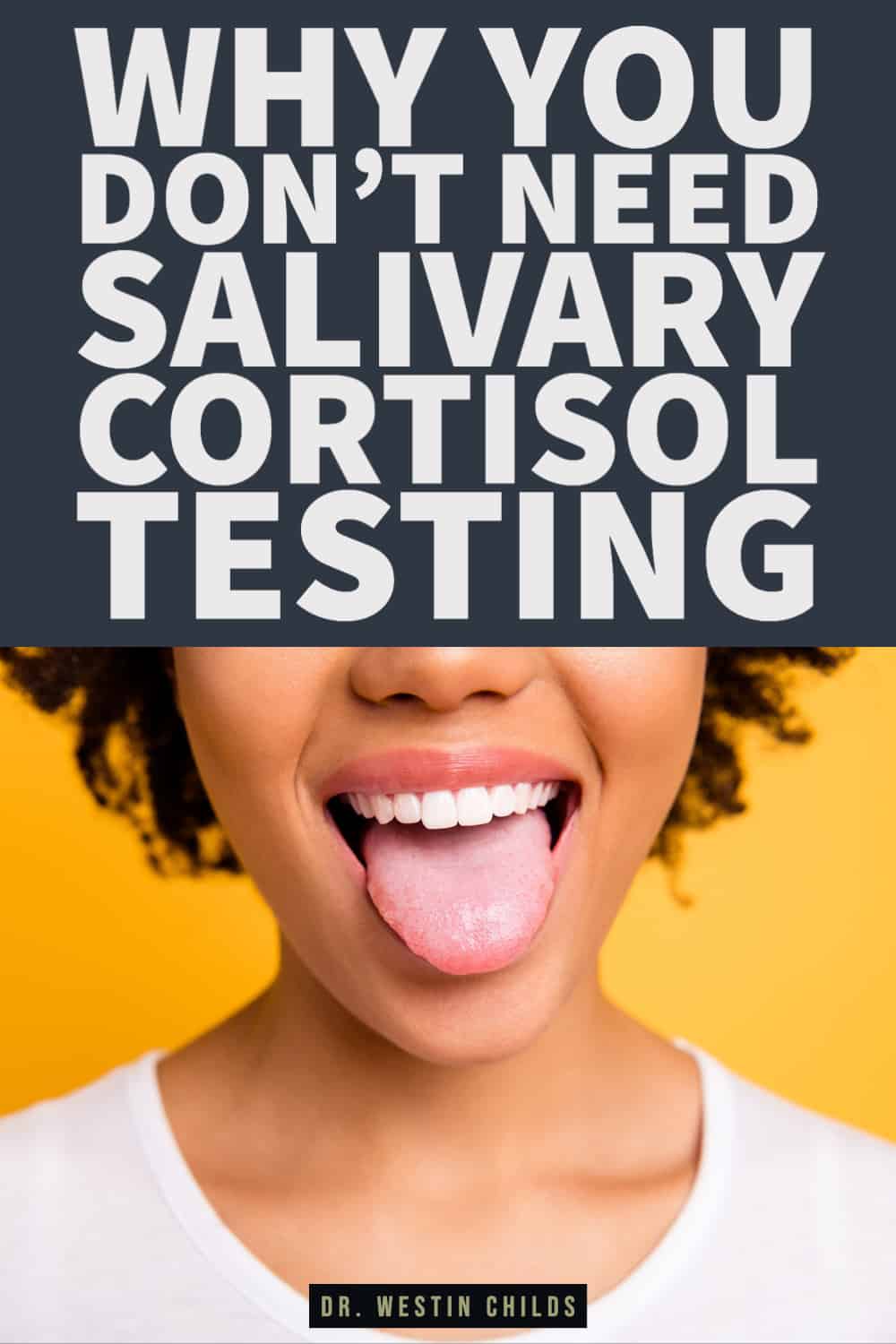Is salivary cortisol testing worth the price tag?
There are many ways to check your cortisol level and the salivary method has gained popularity over the years but is it the best way?
In this post, we are going to discuss why you may want to hold out on getting your salivary cortisol levels checked, a different (better and cheaper) approach to testing your adrenal function, and how to proceed with treatment.
Let’s jump in:
Why Check your Salivary Cortisol Levels?
To start our discussion we need to talk about a condition known as “adrenal fatigue”. (1)
Why?
Because this condition is the reason for all the fuss about cortisol and cortisol testing!
Adrenal fatigue is a condition, recognized in the alternative medicine world and not the conventional world, which occurs as a result of chronic and repeated stress.
This stress ultimately impacts your adrenal function and, it’s thought, that it may result in changes to your cortisol levels over time.
The problem with this theory is that it has never been proved in tests, but it does sound good in theory.

For this reason, many conventional doctors simply don’t believe in the condition which has led alternative doctors to try and find ways to accurately and consistently diagnose the condition.
There is no doubt in my mind that adrenal fatigue is a condition that results from repeated stress on the body, but I don’t think it impacts cortisol levels in the way that most people believe it does.
This means that testing for cortisol may not be as effective as once thought.
It’s traditionally felt that chronic and repeated stress leads to an increase in cortisol levels initially, as the body responds to stress which then fades to a reduction in cortisol over a long period of time.
This trend is said to be picked up with salivary cortisol testing (and perhaps urinary cortisol testing).
Because of this, many alternative doctors and physicians frequently recommend salivary cortisol testing to identify the presence of this condition. (3)
And, it should be noted, that they often do find it.
Reasons to Avoid Salivary Cortisol Testing
Many patients find it frustrating to get treatment for conditions such as adrenal fatigue because they are not recognized by conventional physicians.
This means that when they go into their doctor’s office they may be refused proper testing.
This can leave patients frustrated and they may start looking for help from outside sources.
They are often relieved to find that they CAN test for cortisol via the salivary method, but they don’t realize that there are other ways to assess cortisol as well.
Try to avoid this trap, because you can get helpful information from serum cortisol (you just need to understand how to look at your results).
And while it is true that if you look hard enough for cortisol imbalances you will find them, what’s more important is knowing the value that this information provides.
If you are able to get adequate treatment without this advanced testing, then doesn’t it negate the effectiveness of the test itself?
And that’s exactly one of the main problems with salivary cortisol testing (and even urinary cortisol testing).
The information from the test doesn’t always change how you should look at your treatment or what you should treat with.
When it comes to adrenal fatigue and other adrenal-related disorders, you may be surprised to know that there are actually very few treatment options.
And, to complicate things further, the treatment for low cortisol is almost the exact same as the treatment for high cortisol.
With this in mind let’s talk about the reasons you may want to avoid salivary testing and what you can do instead:
#1. The Results Don’t Change Your Treatment
Whenever you get a test, especially an expensive test, you always need to ask yourself how the results of the test will impact your treatment.
In medicine, we try to stay away from unnecessary tests that don’t give us any extra information about how to treat the patient.
This philosophy should hold true for salivary cortisol testing as well.
If you get your cortisol tested then you better hope that the results of the test will impact how you look at your treatment in some way.
Otherwise, the test is just a waste of time and money.
And salivary cortisol testing doesn’t actually give you information that will dramatically change your treatment (at least not more than what you can get from regular serum cortisol testing).
What do I mean?
There’s really only two results that we care about or that we treat when it comes to your adrenal health.
The treatment for adrenal fatigue and other adrenal-related issues is targeted at whether your cortisol is high or low.
Knowing the degree of cortisol elevation doesn’t change treatment and neither does knowing what time of day your cortisol is elevated (both of these can be seen on salivary cortisol testing).
Why?
Because the standard treatment, whether your cortisol is high or low, is essentially the same.
You’ll need to do the following:
- Ensure that you are getting 8 hours of sleep each night (4)
- Reduce your intake of caffeine (5)
- Take activated B Vitamins (6) – You can find high-quality B Vitamins to help you here.
- Consider using Adrenal Glandulars and Adaptogens (7)
- Consume a healthy diet with sufficient healthy carbohydrates (8)
These treatments don’t change if your cortisol is high or low on salivary testing, it’s always the same!
The only exception is when you have consistently high cortisol levels, (9) which need to be treated slightly differently.
But you can identify the presence of high cortisol with standard serum testing (through blood work).
#2. Treatment is Cheaper than Testing
Another important point worth considering is the cost of the test.
Most salivary cortisol tests are NOT covered by insurance and, as a result, tend to be expensive.
You can get salivary cortisol testing for anywhere from $150 to $300, depending on which lab you look at.
In addition, some Doctors will sell the test to you at a markup to increase the amount of money that they make each time a patient gets it done (making it more expensive on your part).
In almost every case (with few exceptions), it’s actually cheaper, and healthier, to simply undergo the treatment if you have all of the symptoms of adrenal fatigue.
Let me ask you a question:
Do you think it’s ever a bad idea to start eating healthier? To cut back on the number of refined sugars you eat or processed foods that you consume? To cut back on how much coffee you drink?
You don’t need an expensive lab test to tell you the answer!
The only exception is with the use of supplements, but even these are significantly cheaper than undergoing salivary testing.
These supplements may range from $50-$100, but they also contain healthy ingredients such as adaptogens to help you tolerate stress and other B vitamins that you should be consuming anyway.
#3. Serum Cortisol Still Gives Valuable Information
Serum cortisol is often ignored as a way to measure adrenal status, (10) mostly because it’s often ignored by conventional physicians and because, even when your symptoms are severe, it tends to come up as “normal”.
But it still has a lot of value.
There is a wide range of “normal” for cortisol just like there is for any of your hormones, but there is a difference between being “optimal” and being “normal”.
When you look at your results through this lens, you start to see patterns that can help you determine if you have high or low cortisol and how to proceed with treatment.
This should also be understood with the fact that adrenal-related problems probably result from issues relating to cortisol receptor sensitivity (11) and NOT from changes to your serum cortisol levels.
This may explain why so many patients run around with seemingly “normal” cortisol levels even though they have all of the symptoms of adrenal fatigue.

When you apply these “optimal” ranges to serum cortisol testing, and you understand that your serum level may not reflect what is happening at the cellular level, you can learn a lot about your body.
When ordering an 8 am serum cortisol look for these optimal ranges:
- 14-16 mcg/dL = tight optimal range
- Less than 10 mcg/dL = sub-optimal low cortisol level (proceed with treatment trial)
- Greater than 20 mcg/dL = sub-optimal high cortisol level (proceed with treatment trial)
- Between 10-14 & 16-20 mcg/dL = consider treatment but look for other causes of fatigue such as iron deficiency, low B12, poor diet, lack of sleep, etc.
Serum cortisol is not a perfect test, but it can and should be used if you suspect adrenal-related problems.
#4. Serum Cortisol is Covered by Insurance (Salivary Cortisol is not)
Another advantage to using serum cortisol is that it is often covered by insurance which means that it is usually far cheaper than salivary cortisol testing.
Most insurance plans will cover lab tests, including hormones, provided your doctor codes them correctly!
If you have fatigue, other hormone imbalances such as hypothyroidism, or suspicion of adrenal-related issues then your insurance should cover serum cortisol testing.
While you are getting your cortisol tested you can also get assessed for other common hormone disorders such as hypothyroidism and sex hormone imbalances.
#5. Adrenal Glandulars and Adrenal Adaptogens can Help both High and Low Cortisol
If you weren’t already convinced that you didn’t need to order salivary cortisol testing then this one might persuade you otherwise.
Would it come as a surprise to know that most of the treatments for adrenal fatigue, including adrenal adaptogens and adrenal glandulars, help to treat both high and low cortisol levels?
It appears, according to some studies, that these supplements help your body to tolerate stressful situations. (12)
The net result is a normalization of cortisol levels in your body.
That means if your cortisol is high, these supplements may help your body lower cortisol.
It also means that if your cortisol level is low, they may help bring them up.
So, even if you blindly treated your adrenal issues with supplements such as glandulars or adaptogens, there is a fairly high chance that you will help your cortisol level in some way.
What to do Instead of Salivary Cortisol Testing (+ How to Treat)
What should your next steps be?
After reading this I don’t want you to think that it’s unimportant for you to test your adrenals because that is not my intent.
Instead, I want you to consider a different approach to looking at your adrenal function.
One which focuses on using cost-effective strategies designed to help reduce the cost of your therapies while providing you with the best results.
It’s entirely possible that you may need to check your salivary cortisol at some point because standard lab tests are not giving you helpful information.
This could happen.
But, this seems to be the exception rather than the rule.
So what should you do instead?
- Step #1: Get your SERUM cortisol tested first and look at your results with the optimal ranges in mind. Serum cortisol will be covered by insurance and can help you determine if your cortisol is high or low.
- Step #2: If your cortisol is abnormal (high or low) consider proceeding with treatment.
- Step #3: Address lifestyle factors (13) (sleep, stress reduction, diet, and exercise). These changes should result in improvement and should not cost a significant amount of money.
- Step #4: Consider using high-quality adrenal supplements which contain either adrenal glandulars or adrenal adaptogens.
- Step #5: Recheck your serum cortisol after 2-3 months of therapy to see if any progress has been made.
- Step #6: If you still remain symptomatic, or if you feel that something is amiss in your body, consider getting either salivary or urinary cortisol testing.
I’ve had great success in using this adrenal supplement in both patients with adrenal issues (and hypothyroid issues) and this is the one that I personally used while I was recovering from adrenal fatigue.
Conclusion
The information in this post represents my thoughts and feelings on the use of salivary cortisol testing.
I’m always trying to help patients find the best treatment while attempting to reduce the cost of treatment in the process.
I’ve found that by cutting out testing for salivary cortisol (except in certain instances), my results for patients remain the same.
I hope you found this information helpful as you journey towards finding what kind of treatment you need!
Just realize that your adrenal health is very important, but how you go about testing for them is a different story.
Now I want to hear from you:
Have you had your adrenals tested via the salivary route?
Did the information on your test help you with your treatment?
Would you have been able to get results without this test?
Why or why not?
Share your thoughts and comments below!








